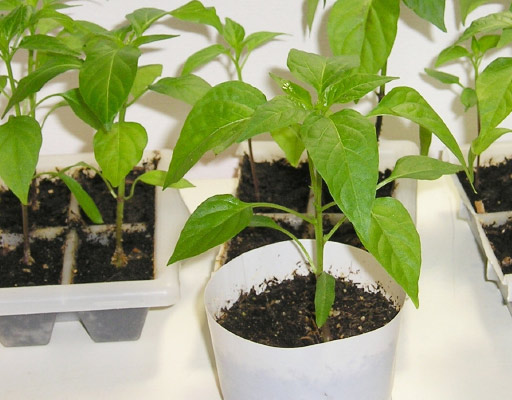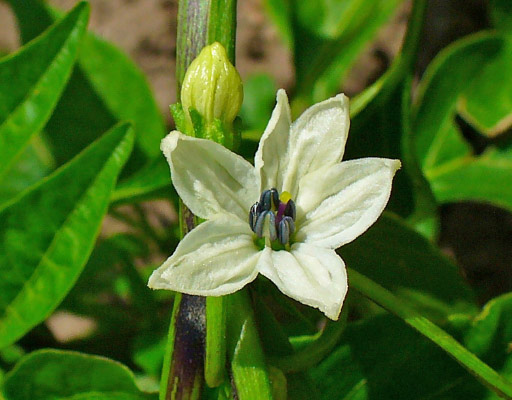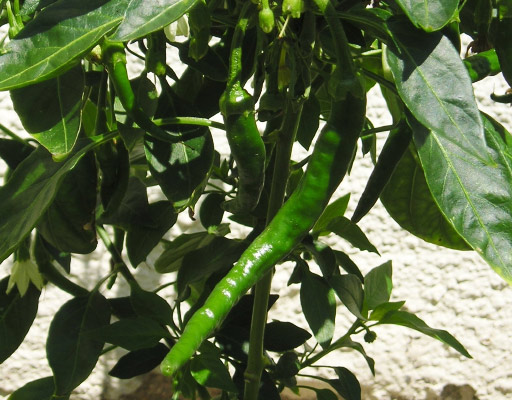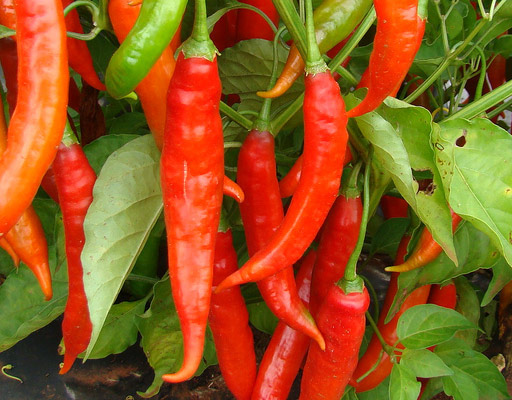Hot Peppers: Cayenne

Seedling 
Flower 
Unripened 
Fully Ripe
The cayenne pepper is most commonly consumed in its powdered form, and used to spice up soups and sauces worldwide. Not the hottest kid on the block, but it is a welcome addition to any hot sauce due to its most flavorful nature.
On The Menu
While appearing in many sauces, the cayenne is most popular in its powdered form. On your grocer's shelf, you can usually find it labeled simply as red pepper. It is heavily featured in many cuisines throughout the globe. Cajun food dishes such as gumbo and crayfish use the cayenne to provide a little punch.
The ever versatile cayenne pepper, also makes an appearance in many Asian dishes as well. It is prominently featured in many Korean, and Chinese Szechuan meals, though in Asia it is known by a different name. When dining out, and you are enjoying a spicy soup or sauce, the cayenne is a likely culprit.
The Bird Pepper
The cayenne pepper is named for the city of Cayenne, in French Guiana, located on the north east coast of Africa. It is also known as the Guinea spice, aleva, bird pepper, and the cow horn pepper, depending on which part of the world you happen to find it. The cayenne is a large pepper, on average with fruit reaching 5-6 inches long, though in some cases up to 10 inches. Not a monster by any means, the cayenne still packs a medium sized punch and ranks at between 30,00 to 50,000 Scoville units.
Interesting Trivia
- The cayenne is believed to be an aphrodisiac.
- It is a known appetite suppressant.
- The cayenne pepper is known to have been cultivated in Central, and South America, over 7,00 years ago.
- Cayenne peppers abundance of vitamin A is believed to help boost the immunity system.
The Cayenne Plant
This plant prefers warm, moist, nutrient-rich soil. It flourishes in warmer climates, taking about 100 days to mature. The plants grow to about 24–48 inches in height. Cayenne plants are mostly perennial in sub-tropical and tropical regions. They may also be grown as annuals in temperate climates, with proper precaution being taken in the winter months.
Recently Added Hot Sauces that Use Cayenne Peppers
- Men Pa'w - Umami
- D.L. Jardine's - Texas Champagne Cayenne Pepper Sauce
- Pantry by Nature - Tiger Sate: Hot
- CaJohns - La Segadora (Reaper)
- Smokin' Texas Gourmet - Angry Twist Pepper Sauce
- Captain Mowatt's - Canceaux Sauce
- HungryBadger Cafe - Badger Heat
- Louisiana Fish Fry - Cravin' Cajun Hot Sauce
*Note that many hot sauces do not specify the type of pepper used on their list of ingredients, and instead use a general phrase like “chile pepper”, so a number of sauces on our hot sauce list may not be included.
Sources and Attribution:
- Photo (cropped): Capsicum annuum 'de Cayenne' by H. Zell (CC-BY-SA-3.0) via Wikimedia Commons
- 2 Photos (cropped): Chili Cayenne by Maja Dumat (CC BY 2.0) via Flickr
- Photos (cropped): Pimenta Dedo-de-moça by Secretaria de Agricultura e Abastecimento (CC BY 2.0) via Flickr
